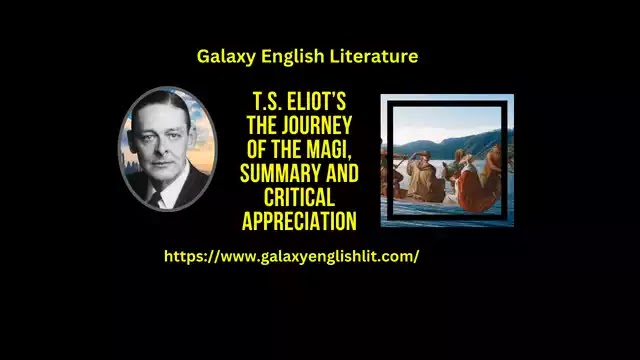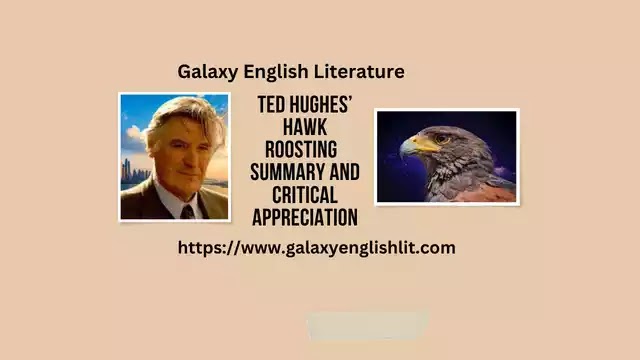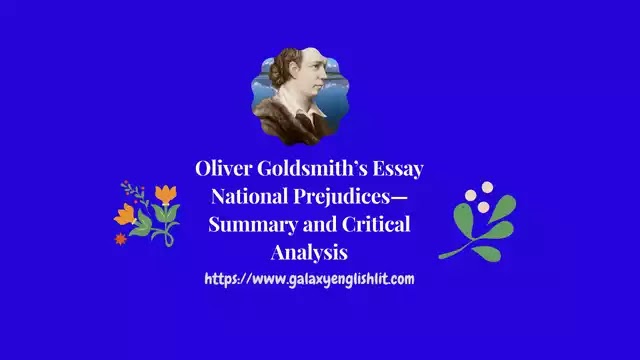Introduction:
Says Wordsworth again and again that he sings but...
“Of truth of grandeur, Beauty, love, and hope.
And melancholy fear subdued by faith;
Of blessed consolations in distress;
Of moral strength and intellectual power;
Of joy in widest commonly spread.
Of the individual mind that keeps her own
Inviolate refinement......”
 |
| Wordsworth As A Didactic Poet |
Certainly, besides being an ardent lover of Nature, William Wordsworth is essentially a moralist, aiming definite in all his works at producing a moral impression which could win for him the crown of a “teacher”. So much does he rever goodness, and so determined is he that his literary work shall be judged at its true value, that he is not content, like Shakespeare, to be simply an artist, to tell an artistic tale and let it speak its own message, he must explain and emphasize the moral significance of his work. He once wrote to his friend Sir George Beaumont, “Every great poet is a teacher. I wish either to be considered as a teacher or as nothing.” In his view, the function of a poet was not just to delight but to teach, to instruct, and to inspire the soul - of course - in a poetic way, by painting a spontaneous vision of simple life shining with the highest truths of Nature and universe.
Wordsworth— The Conscious Artist of Moral State:
Wordsworth comments. “There is scarcely one of my poems which does not aim to direct the attention to some moral sentiment, or some general principle or law of thought, or of our intellectual constitution.” This clearly shows what Wordsworth's aim was! He clears his purpose to Lady Beaumont that the purpose of his “pen” was “to console the afflicted, to add sunshine to day light by making the happy happier, to teach the young and the gracious of every age to see, to think, and to feel and therefore, to become more actively and securely virtuous.” Accordingly, critics have found the poetry of Wordsworth “as a great mourshier and stimulant (Pater) as the very culture of feeling (Stuart Mill), and as the songs of truths and morals”.
Everywhere he keeps himself present as a conscious teacher of his readers. Throughout his life he strove to appeal to feelings which were “sane, pure and permanent”. What he comments again and again is not vain but fully and successfully supported by his poems. From the time of “Tintern Abbey” when he first fully realized his poetic power, to the end of his life, there is an inspiring light in his work, implied or explicit. His most spontaneous outburst of joy has some deep relation to moral questions. His preface to the Excursion, edition 1814, presents his aimed “conscious morality”:
And I am conscious of affecting thoughts
And dear remembrances, whose presence soothes
Or elevates the mind, intent to weigh
The good and evil of our mortal state.
Nature— the Teacher of the Teacher:
Nature appeals too much to this teacher. Every flower, every petal its each delicate nerve and the smallest blow of fragrance to delights him, inspires him.
In his “Lucy Poems” Nature is dignified as the best teacher of uncorrupted youth. Man i.e. child would develop not only with beauty of looks and figure but also with a moral sense and wisdom if he would be fortunate to grow just three years in sun and shower like Wordsworth's Lucy, who in the hands of Nature learned the great lessons of law and impulse.
Nature is not like man that once loves and betrays at the very next moment. In Tintern Abbey the poet tells his sister “Nature never did betray the heart that loved her”, even when we are grown up and corrupt worldly souls. It is always with us to console us and fill us up with a heat of divine joy.
Nature's spiritual power heals and evokes man; Wordsworth says this in all his poems. Spiritual significance of Nature is told in various works such as “Tintern Abbey”, “Ode to Intimations of Immortality”, “French Revolution”, "The Prelude" and many more. In moments oppressed by the “fretful stir and fever of the world”, he got relief by thinking of the scene near Tintern Abbey. He calls us to cheer his divine experience. In the Simplon Pass, how the crags, rocks, brooks, waterfalls, the blue sky—the tumult and peace of Nature — led him to discern the presence of a divine spirit. In Tintern Abbey he speaks of the “presence that disturbs me with elevated thoughts” — “a motion and a spirit that impels” everything and “rolls through all things”.
Man often became thoughtless, arrogant, hostile and feelingless to man but Nature is always there to guide our behaviour, to console our wounded soul. In “The Thorn” Nature saves the wretched woman from the villagers’ hostility, calms and consoles her solitary sorrow. '
“Nature is a never failing principle of joy and purest passion”. He writes.
“She has a world of ready wealth.
Our minds and hearts to bless
Spontaneous wisdom breathed by health
Truth breathed by cheerfulness .....”
The lessons of goodness and greatness lie everywhere in the Nature. He says that
“One impulse from a vernal wood
May teach man more of man,
Of moral evil and of good
Than all the sages can.”
One moment of communion with Nature may give man more wisdom than many years of wisdom,
“One moment now may give us more
Than fifty years of reason ...”
Nature is a sure teacher, guide and guardian of man. For Wordsworth Nature is:
“The anchor of my purest thoughts, the nurse,
The guide, the guardian of my heart, and soul,
Of all my moral being. "
It is, therefore, that he is always a lover of the meadows and the woods.
Wordsworth's Poems — Sane, Pure and Permanent Values and Teachings:
Wordsworth's poetry is not the expression of his boiling poetic emotions but it is a universal message, a sane, pure and permanent teaching for anyone who reads and admires him. Firstly, he gives the moral message of love of Nature for moral elevation and spiritual enlightenment in man is possible if he surrenders himself to the laws of Nature and to its chastening influences. Secondly, he sings the significant song of simplicity and plainness. He went to the peasants and humble folk as a fit subject for poetry, ignoring what is coarse and petty in this life for gay lords and ladies of prosperous classes he fixed his gaze upon the qualities of strength, satisfaction, endurance, unaffected simplicity, courage, love, joy and hope which could delight him.
“Love had he found in huts where poor men lie”. So his heroes are Michael and Leech Gatherer with whom he wants to convey the great message of simple living. Their desires are little but hearts too big to keep great lessons of purity, innocence, fortitude and moral strength.
He gives message of satisfaction, courage and contentment. The Leech Gatherer, The Solitary Reaper, Lucy, Michael and Matthew, all his poetic characters teach us all these lessons. In his hard and wearisome job, the leech gatherer has always been close to Nature. He has developed fortitude, courage, resolution of will and independence of mind as he paces his lonely silent way across the vast weary moors. His words teach the poet a lesson which the poet communicates to the reader. His Michael gives the message of patience, courage and hope; Matthew and Solitary Reaper teach us satisfaction and contentment. He makes his readers feel that if an old man like the leech gatherer, lonely man like Matthew, unfortunate man like Michael can face hardship with such firm and happy determination, why he and his readers cannot?
“In that decrepit man so firm a mind
‘God’ said I, ‘be my help and stay secure.
I'll think of the leech gatherer on the lonely moor!”
Wordsworth presents Innocence as the greatest bliss for man. “Heaven lies about us in our infancy!” but as we grow in age “Shades of the prison house begin to close”. So man tries to remain innocent as much as he can because the worldly knowledge is too sordid.
Wordsworth loves the ideals of liberty, equality and fraternity. He has a wide heart to love human beings thus teaches the lesson of humanity. Man is born to love man, to weep his miseries and woes, and to smile at his fortunes and happiness. He should not be arrogant and selfish, jealous and hostile. The wretched woman beside the mound, in “The Thorn”, is faced with the hostility of the villagers who believe her to be a child murderer. They have pity for her miserable fate, her isolation and sorrow but Nature consoles her. Wordsworth says that we can learn from Nature the resilience and fortitude of the old grey thorn tree and the muddy pond, and appreciate the fresh and lively innocence of the child, symbolised by the mossy green mound covered flowers, even if we cannot regain it.
Contentment and innocence are blessings of Nature but the worldly desires destroy our sense of satisfaction and innocence. He is a fool who complains against the doings of Nature but he is wise who accepts the every truth of life, like Matthew:
“I live and sing my idle songs,
Upon these happy plains.”
Wordsworth deplores the extreme materialism and consequent spiritual degradation. He hates men who are actuated only by economic motives by the paltry material prosperity and pursuit of pelf and power. He is sorry to see that “We have given our hearts away a sordid boon” and “the world is too much with us; late or soon”. “We are selfish men”, deplores Wordsworth, and calls Milton:
“Oh! rise us up, return to us again
And give us manners, virtue, freedom, power.”
Wordsworth also gives the lesson of duty. Its main principles are love and truth. Love is the unerring light and truth is the discovery of reason. He says that duty is the “stern daughter of the voice of god!” a light to guide, a rod to check the erring and reprove. It sets us free from vain temptations and calms the weary strife of frail humanity. One al should love liberty but should not “the sport of every random gust”. He also teaches to be optimistic in life. Like an optimist he sees only beautiful and joyous aspects of Nature and never turns his eye upon what is barren and sinister there. The decaying forests never decay completely and finish off, tumult and peace co - exist; joy and woe are parts of life. He also gives philosophic lessons such as, “it is the man of mirth” and “our birth is but a sleep and a forgetting” and “the child is the father of a man”, and “our noisy years seem moments in the being. Of the eternal silence: truths that wake, to perish never ...” and “Yet a wiser mind; according to Wordsworth ‘mourns less for what age takes away than what it leaves behind”.
So it is clear now that Wordsworth's didactic utterances are scattered thickly all through his literature. But how far he could justify himself as a teacher?
How Strongly He Practises His Own Lessons!!! Aldous Huxley remarks, "Let Nature be your teacher", says Wordsworth. The advice is excellent. But how strongly he himself puts it into practice! Instead of listening humbly to what the teacher says, he shuts his ears and he himself dictates the lesson he desires to hear. The pupil knows better than his master; the worship substitutes his own oracles for those of the god. Instead of accepting the lesson as it is given to his immediate intuitions, he distorts it rationalistically into the likeness of a parson's sermon or a professional lecture ...”
To Sum Up:
His poems are a series of moral analysis of rich intrinsic value, discreetly guided by an edifying and utilitarian purpose as Legouis says. His poetry can assuage, reconcile, fortify, and give us quietness as John Morley remarks. His poetry seems to depart from the purely artistic standard, of art for art's sake, and to be actuated by a definite moral purpose. He is not the teacher of England, not vaguely but definitely with the superb faith in his lessons and message, and with the conscious moral purpose to uplift and to instruct. Comments John Stuart Mill, “What made Wordsworth a medicine for my state of mind, was that they expressed, not mere outward beauty, but states of feeling, and of thought coloured by feeling, under the excitement of beauty. They seemed to be the very culture of the feelings, which I was in quest of. In them I seemed to draw from a source of inward joy, of sympathetic and imaginative pleasure, which could be shared by all human beings......”





